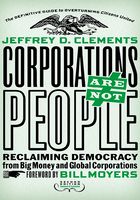
Preface to the First Edition
Of course corporations are not people. Do we really need a book about that obvious truth? Unfortunately, we do.
After the United States Supreme Court’s decision in Citizens United v. Federal Election Commission in 2010, the identity of corporations and their place in our government of the people is not so obvious anymore, at least not to the Supreme Court and to the armies of corporate lawyers pushing for more corporate constitutional rights. And the fact that corporations are not people does not seem to be obvious to too many cowed and trembling lawmakers at all levels of government. There are exceptions, to be sure, but in the face of wildly unbalanced corporate money and influence, too few of our elected officials stand with conviction and firmness to state the obvious about corporations in defense of the public interest.
Citizens United is the biggest and most radical (to use a word from the dissent of Justice Stevens) decision in a regular series of recent Supreme Court decisions in favor of corporations. In Citizens United, the Supreme Court overturned decades of precedent, reversed a century of legislative effort to keep corporate money from corrupting democracy, and upended the American ideal that we are a government of people rather than a government of corporate wealth. The decision, in many ways, symbolizes how far off track we have fallen from our ideal of the American Republic, governed by the people.
In the pages that follow, I hope to show what Citizens United is all about, where it came from, and what I think this triumph of corporate power means for you and for all Americans. Much of the book is about what I see as the devastating effect of unbalanced corporate power, sustained and strengthened by a deliberate, organized, and extremely well funded campaign to transform—I would say, pervert—our Bill of Rights into a charter for corporations as much and even more than for people.
I also hope to show, however, why we do not have to leave it at that depressing juncture. As I describe in Chapter Seven, thanks to the mechanism of constitutional amendment that has come through before when our democracy is on the line, we can fight back to restore government of the people and to save our country. Thousands of people have started that work already, working for the People’s Rights Amendment as the Twenty-Eighth Amendment to the Constitution. I hope that you will join us; the Resources section that follows Chapter Eight offers some ways you can do that.
Many people across the country have taken up the effort to preserve our nation and world against unbalanced corporate power and have shared their ideas, time, spirit, and hard work with me. I hope that all of them will know how much they have influenced this book and how grateful I am, even if I could not list everyone here.
Bill Moyers is at the top of the list of a few who deserve special mention. Bill has been a hero and a teacher for me and for so many Americans. He tells the truth. Calmly and clearly, to be sure, but make no mistake, he tells the truth, out loud for all to hear. He never gives up on the journey of America and of humanity, and his curiosity, determination, and grace make that journey live for all of us. I cannot say how grateful and honored I am to have him write the Foreword to this book.
I am blessed to be part of the Clements family. Thank you to Marilyn Clements and this wonderful extended clan of opinionated, smart, loving, patriotic people, who work hard for the good, stand for principle, and believe in writing and in books. They put in hours helping me to make this one better.
I am deeply appreciative of so many who early on understood the danger of Citizens United and corporate power, who have worked so hard, and who are bringing such hope and purpose to the cause of liberty and democracy. They have picked up the constitutional amendment banner used so well by our forefathers and foremothers. These modern-day heroes do not accept that our generation is less determined or less true to the American cause of freedom and democracy than those who came before. They reject defeatism. They are standing for people’s rights and against corporate rights, and they have inspired much of this book.
One of these heroes is John Bonifaz, a determined visionary and leader. On top of launching Free Speech for People, a nationwide campaign to overturn Citizens United, he took the time to read drafts and helped make this book better than it would have been. I thank John and all of the friends and supporters who are helping move Free Speech for People and the People’s Rights Amendment forward.
Many others generously shared their time, ideas, comments, and criticisms. My colleague Gwen Stowe, associate at Free Speech for People and manager at Clements Law Office, LLC, made far more contributions to all aspects of this project than I can list. Pam Kogut, my old friend and colleague, first at the Massachusetts attorney general’s office and now at Clements Law Office, LLC, provided smart edits and wise suggestions. I am lucky to work with Pam and Gwen.
I also am grateful for the terrific work of Neal Maillet and the Berrett-Kohler team and for many people who provided comments, suggestions, and correction of errors, including David Korten, Daniel Greenwood, Rob Ellman, Shauna Shames, Kristen Mousalli, Ted Nace, Steve Cobble, and David Swanson. I know that the final product is not everything they might have thought possible, but I also know that it is better thanks to them. Thanks, too, to Thom Hartmann.
Finally, as always, my loving gratitude to Nancy, Will, Sophie, and Ben.
Jeff Clements
Concord, Massachusetts
October 2011